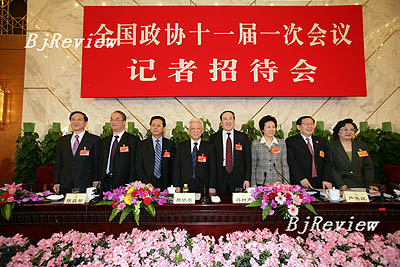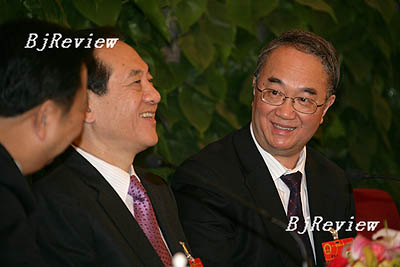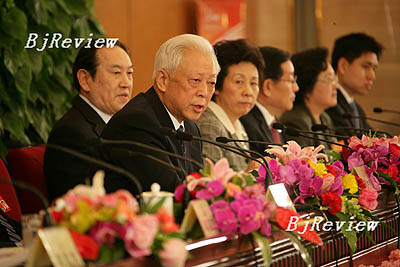|

At a high-profile press conference of the National Committee of the 11th Chinese People's Political Consultative Conference (CPPCC), China's top advisory body, the platform was given to leaders of China's eight non-Communist parties.
Of the eight chairpersons of the parties' central committees, who were all elected to new five-year tenures late last year and five are in their first term. At their first ever group debut in front of the media on March 6, they introduced their respective parties to the public and voiced their full support to China's system of multi-party cooperation and political consultation under the leadership of the Communist Party of China (CPC).
According to Xinhua News Agency, China's non-Communist parties, with a combined membership of more than 700,000, represent specific interest groups, reflect complaints and suggestions from all walks of life.
They were all established before the People's Republic of China was founded in 1949. The oldest, the China Zhi Gong Party, is 83 years old.
Founded in 1945, the China National Democratic Construction Association, with over 110,000 members, mainly attracts successful business people, who advise the ruling party on economic work including energy conservation, pollution, financial structural reforms, venture capital and the development of the private sector. The present chairman Chen Changzhi, who joined the association in 1985, was vice minister of supervision for nine years.

Explaining the mechanism of political consultation under China's multi-party cooperation system, Zhou Tienong, Chairman of the Central Committee of the Revolutionary Committee of the Chinese Kuomintang, said that the CPC had treated political consultation very seriously and sincerely. Zhou said, "Our party had for many years suggested that the Central Government shoulder the expenses of compulsory education in China. For a long time compulsory education had been financed mainly by county and township governments. Now the central treasury has shouldered the majority of compulsory education expenses."
Jiang Shusheng from the China Democratic League said members of the league had been invited to more than 70 high-level discussions over the past five years, half of which were presided over by President Hu Jintao and Premier Wen Jiabao.
Jiang, former President of China's prestigious Nanjing University, said, "We will continue to give our suggestions on issues related to important economic and social development. We will also supervise the implementation of some laws and policies. We hope to recommend more excellent league members to government positions."
Of the 180,000 members of the China Democratic League, about 60 percent are from the education circle, including 110 presidents or vice presidents of universities and more than 60 academicians. Five members of the China Democratic League are vice governors, said Jiang.
Yan Junqi from the China Association for Promoting Democracy said the association is a political alliance of intellectuals, which was founded 62 years ago in Shanghai. When she was asked to comment on the role of high-level consultation in government decision making, the former Vice Mayor of Shanghai said, "Since I became the chairwoman of the China Association for Promoting Democracy three months ago, I have been invited five times to participate in consultations, including three presided over by President Hu Jintao and one by Premier Wen Jiabao."

Sang Guowei, a pharmaceutical expert and Chairman of the Chinese Peasants and Workers Democratic Party, told reporters that 60 percent of his party members are medical workers. He said more than 12,000 members of his party fought the SARS (severe acute respiratory syndrome) outbreak in 2003. He added, "After Guizhou Province was struck by cold weather and snowstorms this winter, our party began promoting two causes in rural areas. One is the construction of a network of village clinics and the other is a project to cultivate herbs used in traditional Chinese medicine that can raise farmers' income."
Minister of Science and Technology Wan Gang, also Central Committee Chairman of the China Zhi Gong Party, had already become one of the highest-profile CPPCC National Committee members. As China's first non-Communist party minister in decades, Wan was frequently asked about how he had performed his ministerial duties as a non-Communist party member.
Wan said before he assumed the position of minister he was assured by Premier Wen Jiabao in person last May that he would enjoy full duties, responsibilities and power.
Most members of the China Zhi Gong Party, founded in San Francisco in the United States in 1925, have an overseas working and education background. Wan received his doctorate from Clausthal University of Technology in Germany in 1991.
"At the CPPCC session we'll discuss how to help returned students from abroad to seek personal development in China," Wan said.
Han Qide, a medical professor at Peking University, represented the Jiu San (literally meaning September 3) Society of scientists and scholars.
Han said over 60 members of his party are members of the Chinese Academy of Sciences or Chinese Academy of Engineering. Han said that his party would raise a proposal on enhancing the efficiency of investment in science and technology development during the CPPCC session.
"We are glad to witness the steady growth of government investment into science and technology in recent years, but the investment efficiency has dropped substantially," he said.
Lin Wenyi, Chairwoman of the Taiwan Democratic Self-Government League Central Committee and a Taiwan native, told the audience that her party is the only one in China named after a province.
"The league, consisting of people from Taiwan, is one of the participating parties in state affairs," she said. "We'll work harder to promote the peaceful reunification of the motherland and to enhance cross-Straits personnel exchanges, trade relations and economic development."
Raising examples, Lin said her party had helped Taiwan-born young people living overseas to work as short-term volunteers in the Beijing Organizing Committee for the Games of the XXIX Olympiad and organized over 1,400 group visits across the Taiwan Straits, mainly from Taiwan to the mainland.
Lin was trained as an engineer at Beijing's Tsinghua University and had been Beijing's vice mayor for seven years. | 